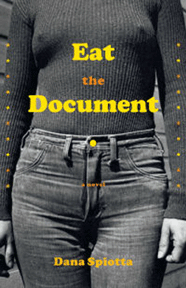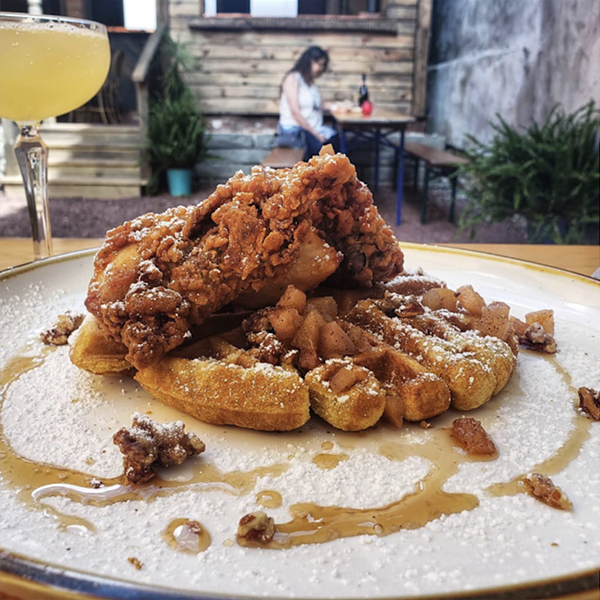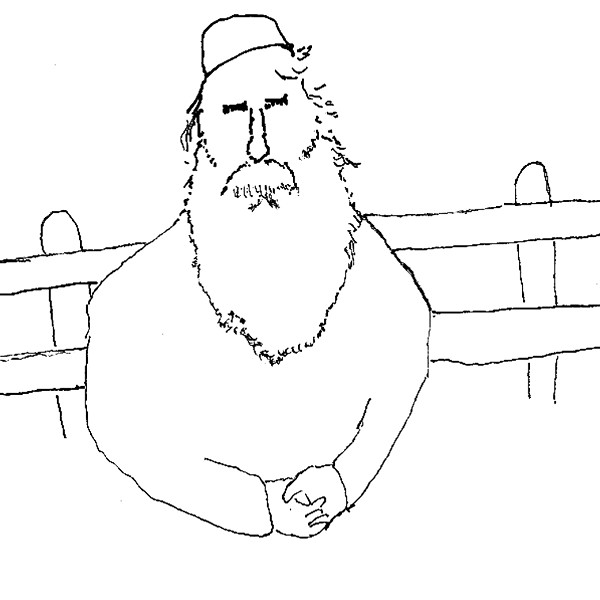From Eat the Document by Dana Spiotta
Five state borders, and then she was handing over the cash for the room—anonymous, cell-like, quiet. She clutched her receipt in her hand, stared at it, September 15, 1972, and thought, This is the first day of it. Room Twelve, the first place of it.
Even then, behind a chain lock in the middle of nowhere, she was double-checking doors and closing curtains. Showers were impossible; she half-expected the door of the bathroom to push in as she stood there unaware and naked. Instead of sleeping she lay on the covers, facing the door, ready to move. Showers and bed, nakedness and sleep—she felt certain that was how it would happen, she could visualize it happening. She saw it in slow motion, she saw it silently, and then she saw it quickly, in double time, with crashes and splintered glass. Haven’t you seen the photos of Fred Hampton’s mattress? She certainly had seen the photos of Fred Hampton’s mattress. They’d all seen them. She couldn’t remember if the body was still in the bed in the photos, but she definitely remembered the bed itself: half stripped of sheets, the dinge stripe and seam of the mattress exposed and seeped with stains. All of it captured in the lurid black-and-white Weegee style that seemed to underline the blood-soak and the bedclothes in grabbed-at disarray. She imagined the bunching of sheets in the last seconds, perhaps to protect the unblessed person on the bed. Grabbed and bunched not against gunfire, of course, but against his terrible, final nakedness.
“Cheryl,” she said aloud. No, never. Orange soda. “Natalie.” You had to say them aloud, get your mouth to shape the sound and push breath through it. Every name sounded queer when she did this. “Sylvia.” A movie-star name, too fake sounding. Too unusual. People might actually hear it. Notice it, ask about it. “Agnes.” Too old. “Mary,” she said very quietly. But that was her real name, or her original name. She just needed to say it.
She sat on the edge of the bed, atop a beige chenille bedspread with frays and loose threads, in her terry-cloth bathrobe, which she’d somehow thought to buy when she got her other supplies earlier in the afternoon. She had imagined a bath as bringing some relief, and the sink into the robe afterward seemed important. She did just that, soaked in the tub after wiping it clean. Eyes trained on the open door of the bathroom, and careful not to splash, she strained to determine the origins of every sound she heard. She shaved her legs and scrubbed her hands with a small nailbrush, also purchased that day. She flossed her teeth and brushed her tongue with her new toothbrush. She tended to the usual grooming details with unusual attention: she knew instinctively that these details were very closely tied to keeping her sanity, or her wits, anyway. Otherwise she could just freeze up, on the floor, in her dirty jeans, drooling and sobbing until they came and got her. Dirt was linked to inertia. Cleanliness, particularly personal cleanliness, was an assertion against madness. It was a declaration of control. You might be in the midst of chaos, terrified, but the ritual of your self-tending radiated from you and protected you. That was where Mary figured a lot of people got it wrong. Slovenliness might be rebellious, but it was never liberating. In fact, she felt certain that slovenly and sloppy attention to personal hygiene surrendered you to everything outside you, all the things not of you trying to get in.
Excerpted from Eat the Document by Dana Spiotta. Copyright © 2007 by Dana Spiotta. Reprinted by permission from Scribner, an imprint of Simon & Schuster, Inc.
















